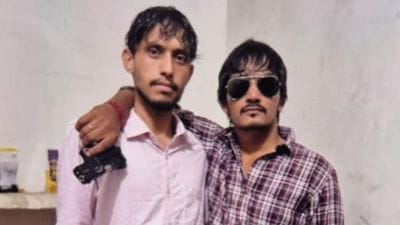Bofors ruling: smoking guns and posers
This writer was away at home in north Bihar when the Delhi High Court passed its order quashing the chargesheet against the Hindujas in the ...

This writer was away at home in north Bihar when the Delhi High Court passed its order quashing the chargesheet against the Hindujas in the Bofors case. The grounds: the CBI’s failure to follow the procedure laid down by the Supreme Court in its December 18, 1997 order which vested the superintendence of the CBI with the CVC; and the by-passing of the CVC by not obtaining its consent before filing the chargesheet. The order raises important questions of law and procedures, the jurisdiction of legislature and judiciary as well as the efficacy of our system in fighting corruption in ‘‘high places’’.
In the first place, the December 1997 Supreme Court order was by way of direction to give statutory status to the CVC. This obviously required an enactment of law. A CVC bill is already pending enactment by Parliament. But till the Supreme Court orders regarding the CVC’s status are put into the statute books, are they binding on enforcement agencies like the CBI? And binding to the extent that could be the ground for quashing a chargesheet before a trial Court?
Does the Delhi High Court order not run counter to the general principle underlying the relevant sections of the CRPC, that a trial should not be interfered with unless there is fear of the accused being denied natural justice? Hundreds and thousands of cases have been filed and adjudicated by judges and courts since the CBI’s inception without following the procedure contained in the Supreme Court order. Will all those cases fall under the category of denial of natural justice to accused?
Further, nowhere has the Supreme Court said or even implied that the CVC’s approval was required for filing a chargesheet by the CBI; on the contrary, the order indicates that the CVC would help the CBI in getting sanction with the relevant authorities expedited. The circumstances in which this sanction is to be obtained before the CBI files its chargesheet, the authorities from whom it’s needed have already been laid down by the law, either under Section 197 of the CRPC or Section 19 of the Prevention of Corruption Act. The CVC could not be made another sanctioning authority, which in fact will be contrary to law; nor has the Supreme Court said any such thing. The CVC’s role is entirely advisory in the matter.
|
Till the Supreme Court orders regarding the CVC’s status are put into the statute books, are they binding on enforcement agencies like the CBI? And binding to the extent that could be the ground for quashing a chargesheet before a trial court? |
The December 1997 Supreme Court order, was no doubt a historic one, in that it required the CVC to be given statutory status, struck down an illegal Directive No 4.7 (3) of single Directive, which required the CBI to take sanction of the department concerned before initiating any action against decision-making level offices, and gave directives to ensure proper selection of CVC and CBI director , a fixed tenure for the CBI. But the order wasn’t flawless. The same court — in fact the same judge presiding over the bench — gave an order in this writer’s transfer case, which was described by Arun Shourie, now Disinvestment Minister, as a ‘‘fatal doctrine from the Supreme Court’’ in his book Courts and Their Judgements.
And the Supreme Court order in the matter of the CVC’s ‘superintendence’ is vague and contradictory. The order started by saying: ‘‘The CVC shall be answerable for efficient functioning of the CBI’’ and then adds ‘‘while government shall remain answerable for the CBI functioning’’. To introduce visible objectivity, the CVC will be entrusted with the responsibility of ‘‘superintendence’’ of CBI functioning. How is this reconcilable?
Earlier, the court conceded that ‘‘no doubt, the overall control of the agency and responsibility of the functioning has to be in the executive’’. How can the two work together? And who will be the CVC? According to the court order, the selection will be made from a panel of outstanding ‘‘civil servants and others’’. This person could also be a bureaucrat, including a police officer. In fact, more often than not, it would be so. In other words, the power of ‘superintendence’ over the CBI will pass from the minister to a civil servant. Howsoever outstanding the civil servant may be, this will go against the very principle of ministerial responsibility, parliamentary control and governance. The present CBI Director was kept in an acting capacity for a long period because some one in the selection board, headed by the CVC, wrongly interpreted that according to the Supreme Court order, only those with two years of service and more could be considered for the director’s post. The government, in response, decided to seek a clarification from the Supreme Court and got rebuffed in the process.
To whom will the CVC be accountable? None: neither to the court of law nor to Parliament. In any case, the Parliament needs to decide on this. And, while doing so, will the Parliament and political executive use their wisdom and vast experience, which they are not necessarily totally deprived of, or are they expected to merely sign the dotted line?
Not only the Bofors case, but also thousand other cases were likely to be thrown out if the High Court order wasn’t reversed. The CBI rightly filed an appeal in the Supreme Court, which stayed the high court order and directed continuance of the trial.
The Delhi High Court not only quashed the chargesheet against Hindujas, but also passed severe strictures against the CBI. Inter alia, it said, ‘‘The CBI must not drag its feet or file a half-baked chargesheet when the high and mighty are involved. Also, it should not file frivolous cases against the innocent at the behest of those in power.’’ The judge further observed ‘‘I cannot be unmindful of the fact the CBI has been under a cloud. It has been accused of being a political shield or a whip of the government of the day.’’
The counsel of Hindujas R K Anand, declared that ‘‘the CBI made many blunders during investigations and were pursuing the case despite the Swiss authorities having made clear to them (CBI) last year that the money in the Swiss bank accounts was not found linked to the ‘Bofors’ transactions.’’
Any one with little knowledge of the Swiss Law of Secrecy will tell that they would have never handed over bank papers to the CBI if they found that money in Swiss banks wasn’t linked to Bofors transactions. In any case, this is a matter which has to be determined in a court of law during trial. As to the judge’s observation, while one may not hold brief for every act of omission or commission of the CBI, its track record has generally has been of a high standard in investigating cases against high profile accused. This, notwithstanding the road blocks it has faced from different quarters in several cases.
(The writer is a former CBI joint director and ex-DG, Bureau of Police Research and Development)
Photos





- 01
- 02
- 03
- 04
- 05


























